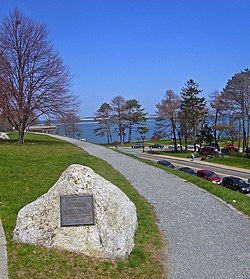| National Day of Mourning | |
|---|---|
 The National Day of Mourning plaque on Cole's Hill in Plymouth, Massachusetts | |
| Observed by | Native Americans in the United States |
| Significance | Honoring ancestors, acknowledging current struggles of Native people, remembrance, spiritual connection, protest of racism and oppression, dispelling of Thanksgiving mythology |
| Observances | Gathering and protest held in lieu of Thanksgiving celebrations in the United States |
| Date | Fourth Thursday in November |
| 2025 date | November 27 |
| 2026 date | November 26 |
| 2027 date | November 25 |
| 2028 date | November 23 |
| Frequency | Annual |
| Related to | Thanksgiving (United States) Unthanksgiving Day |
The National Day of Mourning is an annual demonstration, held on the fourth Thursday in November, that aims to educate the public about Native Americans in the United States, notably the Wampanoag and other tribes of the Eastern United States; dispel myths surrounding the Thanksgiving story in the United States; and raise awareness toward historical and ongoing struggles facing Native American tribes. The first National Day of Mourning demonstration was held in 1970 after Frank "Wamsutta" James's speaking invitation was rescinded from a Massachusetts Thanksgiving Day celebration commemorating the 350th anniversary of the landing of the Mayflower . James instead delivered his speech on Cole's Hill in Plymouth, Massachusetts next to a statue of Ousamequin, where he described Native American perspectives on the Thanksgiving celebrations. The gathering became an annual event organized by the United American Indians of New England (UAINE) and coincides with both Thanksgiving Day in the United States and with Unthanksgiving Day, an annual ceremony held on Alcatraz Island in California.

